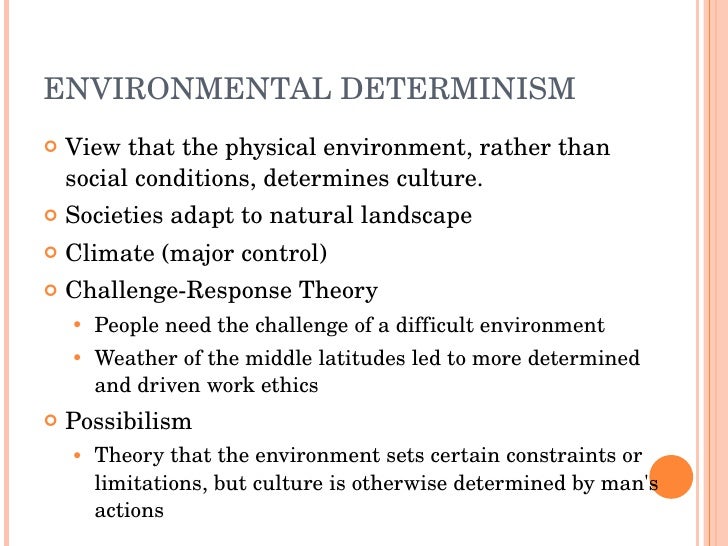Determinism And Possibilism In Geography Pdf Notes
Name:_____ date:_____ he geography in depth chapter 3 t philosophies of environmental determinism and possibilism. Environmental determinism (also known as climatic determinism or geographical determinism). Geography and pre-colonial African state-building. Environmental determinism (also known as climatic determinism or geographical determinism) is the study of how the physical environment predisposes societies and states towards particular development trajectories. Nineteenth century approaches held that climate and terrain largely determined human activity and.
Possibilism & Determinism Image-5 Possibilism & Determinism Image-5 Views on Determinism • Greek (Aristotle) • Roman (Strabo) • Montesquieu • Arab (Al-Masudi) • Kant • German (Ritter) • Humboldt • RATZEL • Semple • Huntington • Taylor Semple’s - Influences of Geographical Environment (1911) Man is a product of the earth’s surface. This means not merely that he is a child of the earth, dust of her dust, but the earth has mothered him, set him task, directed his thought, confronted him with difficulties, that have strengthened his body and sharpened his wits, gave him his problems of navigation or irrigation and at the same time whispered hints for their solution. Critics of Environmental Determinism • Spate - without man environment does not exist • It separates nature from man - breaks unity • Exaggerates nature’s role in determining human life • Data insufficient for supremacy of nature Neo – Determinism (Stop & Go Determinism) • Propounded by TAYLOR • Short Term – People Attempt Whatever they Wish • Long Term – Environment Wins • Man is like the traffic controller – Alters rate but not direction of progress. • In no environment are the possibilities limitless & for every choice a price must be paid Possibilism • Lucien Febvre – “The true and only geographical problem is that of utilization of possibilities.

There are no necessities, but everywhere possibilities”.
Possibilism in is the theory that the environment sets certain constraints or limitations, but culture is otherwise determined by social conditions. In used this concept in order to develop alternative approaches to the dominant at that time in ecological studies. Theory by in 64 BC that humans can make things happen by their own intelligence over time. Strabo cautioned against the assumption that nature and actions of humans were determined by the physical environment they inhabited.
He observed that humans were the active elements in a human-environmental partnership. The controversy between geographical possibilism and determinism might be considered as one of (at least) three dominant controversies of contemporary geography. The other two controversies are 1) the 'debate between neopositivists and neokantians about the 'exceptionalism' or the specificity of geography as a science [and 2)] the contention between and about what is—or should be—geography'. Possibilism in geography is, thus, considered as a distinct approach to geographical knowledge, directly opposed to geographical determinism.
See also [ ] • References [ ]. Mediachance Editstudio 6 0 5 Rarest.